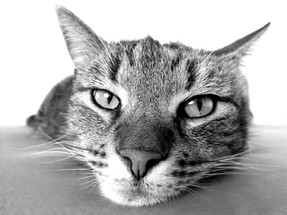Posted by Vikki Schlegel on 26th Dec 2023
Hair Balls in Cats, 5 Home Remedies to Reduce and iliminate them
Let's talk hairballs!! Hairballs are a common issue for cats, especially those that groom themselves frequently. While occasional hairballs are normal, frequent or severe hairball problems may require attention. Here are five natural remedies that may help reduce hairballs in cats:
- Regular Brushing: Regular brushing helps remove loose and dead hair from your cat's coat, reducing the amount of hair they ingest during grooming. Brushing also promotes a healthy coat and minimizes shedding. Choose a brush that suits your cat's fur type.
- Dietary Fiber: Adding more fiber to your cat's diet can help move hair through the digestive system, reducing the likelihood of hairballs. Consider incorporating a high-fiber cat food or adding a small amount of canned pumpkin (plain, not pie filling) to their meals. Always consult your veterinarian before making significant changes to your cat's diet.
- Hairball Remedies/Pastes: There are various hairball remedies available in paste or gel form that can be given to your cat. These products usually contain lubricants that help hairballs pass through the digestive tract more easily. You can find them at pet stores or ask your veterinarian for recommendations.
- Cat Grass: Providing your cat with access to cat grass (such as wheatgrass) can help induce vomiting, allowing your cat to expel hairballs before they become problematic. Cat grass is safe for most cats and can be grown indoors or purchased at pet stores.
- Increased Hydration: Ensuring that your cat stays well-hydrated is essential for their overall health and can help prevent hairballs. Provide fresh water at all times and consider adding wet cat food to their diet, as the moisture content can be beneficial.
Here is a link to my Amazon Store front and my list to the products I use and recommend for hairballs
Before implementing any remedies, it's crucial to consult with your veterinarian, especially if your cat is experiencing persistent hairball issues. They can help rule out any underlying health concerns and provide guidance on the most suitable approach for your cat's specific needs. If your cat exhibits signs of distress, such as persistent vomiting, lethargy, or a lack of appetite, seek prompt veterinary attention.

